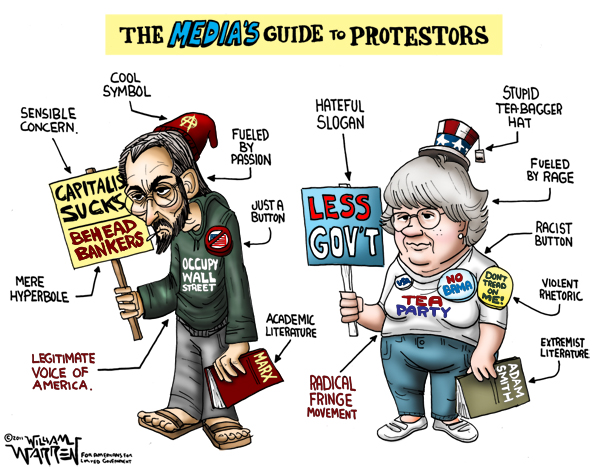There have been more casualties in Afghanistan under less than 3 years of Obama than we did under 8 years of Bush. Additionally, in the first 3 years of the Iraq war, we had fewer casualties than two and a half under Obama. This is not to criticize Obama for these deaths; that’s what happen in war. But Reason magazine notes that this raises 2 questions. "First, where are the antiwar protests? And second, where is the press?" The "anti-war" protestors are, as I’ve said before, more anti-Bush (or anti-Republican) than anything else. And the press are tied up trying to dig up dirt on Sarah Palin. It’s a full-time job, y’know.
Unions hand-picked 6 of the most vulnerable Republican state senate districts to target for recall. They just needed 3 wins to take control. They could only manage 2. Granted, recall elections have been notoriously difficult to win over the years, but if Democrats and the unions that sponsor them can’t get their base energized over their own referendum on alleged "anti-worker" sentiment in hand-picked districts, that doesn’t say much about how the public views them.
Atheists seem to believe that if humanity would just get rid of this archaic religion thing, violence would drop and peace would reign. Just ask Richard Dawkins, Chris Hitchens, or even John Lennon. Yeah, well, how did that work in the Soviet Union, where atheism was essentially the national religion? Or in Europe today, especially Britain, where religion is on the decline?
And speaking of ideas not working, how’s that gun ban in Britain working out for those store owners in the middle of the riots?
Remember the spontaneous "You lie!" outburst by Rep. Joe Wilson of S. Carolina during an address by President Obama about his health care bill? Joe said that after Obama said, "There are also those who claim that our reform efforts would insure illegal immigrants. This, too, is false. The reforms — the reforms I’m proposing would not apply to those who are here illegally." Well guess what? Turns out Joe was right.
Why do we need voter ID laws? To keep this from happening; overenfranchised Democratic voters. And how about this bit of irony: "While NAACP President Benjamin Jealous lashed out at new state laws requiring photo ID for voting, an NAACP executive sits in prison, sentenced for carrying out a massive voter fraud scheme."
Dale Franks of Questions & Observations has some great points about our economic situation. A couple of paragraphs, from one post talking about the hole we’re in:
And don’t come back at me with some lame "Our GDP:Debt ratio was 120% at the end of WWII" silliness. Yes it was. And you know how we fixed it? We cut Federal spending from $92 billion in 1945 to $38 billion in 1949. For 2011, 40% of the federal budget was financed with borrowed money: We’ll spend $3.818 trillion, of which $1.645 trillion is borrowed. If we funded only defense, Medicare/Medicaid, and Social Security, and interest on the debt, we’d still have a deficit of $673 billion. Just to balance the budget this year—forget paying off any debt—we’d have to cut an additional ~25% from Health, Defense, and Pensions. Follow the link and download the CSV file, open it up in Excel, and run the numbers yourself. The magic number to balance the budget this year is the revenue of $2.174 trillion.
That’s $2 trillion this year, not over 10 years.
And from another post, noting that tax increases alone, even historic tax increases and an incredibly rosy set of other assumptions, aren’t going to do it. Spending cuts, substantial cuts, must happen.
In order to pay off this year’s share of the $61.6 trillion in unfunded liabilities, the government will have to collect $4.261 trillion in revenues. With an estimated 2011 GDP of $14.922 trillion, that comes to 28.6% of GDP. If we assume government revenues rise to the historical average, the we’ll need the government to take 31.6% of GDP in tax revenues. Happily, because we’re assuming a 3% rise in GDP and revenues for every year over the next 30 years, that percentage will decline slightly every year, until, in 2041, we’ll only need to collect 20.5% of GDP in tax revenues to pay off the last installment, assuming, again, 14.8% of GDP covers the operation of government. If we go back to the 17.8% figure, then we’ll have to collect 23.5% of GDP in revenues.
Either way, for the next 30 years, we need to collect substantially higher tax revenues than we have collected at any time in the nation’s history, and we have to do it every year for 30 years.
The point being, this is probably not possible, economically or politically. This is how bad our situation is, and how much action we need to take now on spending.
And yet, who gets blamed for trying to bring sanity back to the budget? (Click for a larger version.)


